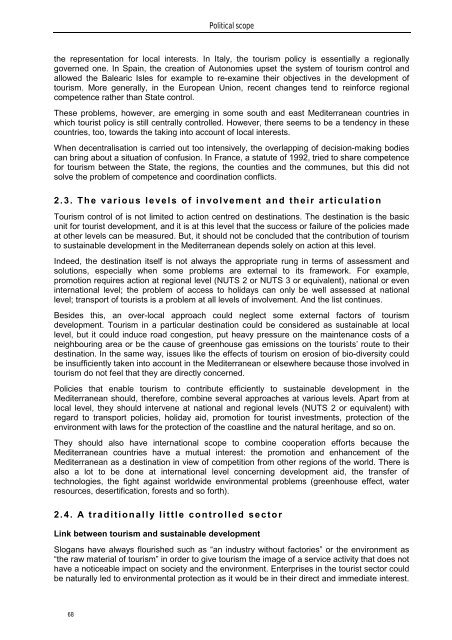dossier sur le tourisme et le développement durable
dossier sur le tourisme et le développement durable
dossier sur le tourisme et le développement durable
Create successful ePaper yourself
Turn your PDF publications into a flip-book with our unique Google optimized e-Paper software.
68<br />
Political scope<br />
the representation for local interests. In Italy, the tourism policy is essentially a regionally<br />
governed one. In Spain, the creation of Autonomies ups<strong>et</strong> the system of tourism control and<br />
allowed the Ba<strong>le</strong>aric Is<strong>le</strong>s for examp<strong>le</strong> to re-examine their objectives in the development of<br />
tourism. More generally, in the European Union, recent changes tend to reinforce regional<br />
comp<strong>et</strong>ence rather than State control.<br />
These prob<strong>le</strong>ms, however, are emerging in some south and east Mediterranean countries in<br />
which tourist policy is still centrally control<strong>le</strong>d. However, there seems to be a tendency in these<br />
countries, too, towards the taking into account of local interests.<br />
When decentralisation is carried out too intensively, the overlapping of decision-making bodies<br />
can bring about a situation of confusion. In France, a statute of 1992, tried to share comp<strong>et</strong>ence<br />
for tourism b<strong>et</strong>ween the State, the regions, the counties and the communes, but this did not<br />
solve the prob<strong>le</strong>m of comp<strong>et</strong>ence and coordination conflicts.<br />
2.3. The various <strong>le</strong>vels of involvement and their articulation<br />
Tourism control of is not limited to action centred on destinations. The destination is the basic<br />
unit for tourist development, and it is at this <strong>le</strong>vel that the success or failure of the policies made<br />
at other <strong>le</strong>vels can be mea<strong>sur</strong>ed. But, it should not be concluded that the contribution of tourism<br />
to sustainab<strong>le</strong> development in the Mediterranean depends so<strong>le</strong>ly on action at this <strong>le</strong>vel.<br />
Indeed, the destination itself is not always the appropriate rung in terms of assessment and<br />
solutions, especially when some prob<strong>le</strong>ms are external to its framework. For examp<strong>le</strong>,<br />
promotion requires action at regional <strong>le</strong>vel (NUTS 2 or NUTS 3 or equiva<strong>le</strong>nt), national or even<br />
international <strong>le</strong>vel; the prob<strong>le</strong>m of access to holidays can only be well assessed at national<br />
<strong>le</strong>vel; transport of tourists is a prob<strong>le</strong>m at all <strong>le</strong>vels of involvement. And the list continues.<br />
Besides this, an over-local approach could neg<strong>le</strong>ct some external factors of tourism<br />
development. Tourism in a particular destination could be considered as sustainab<strong>le</strong> at local<br />
<strong>le</strong>vel, but it could induce road congestion, put heavy pres<strong>sur</strong>e on the maintenance costs of a<br />
neighbouring area or be the cause of greenhouse gas emissions on the tourists’ route to their<br />
destination. In the same way, issues like the effects of tourism on erosion of bio-diversity could<br />
be insufficiently taken into account in the Mediterranean or elsewhere because those involved in<br />
tourism do not feel that they are directly concerned.<br />
Policies that enab<strong>le</strong> tourism to contribute efficiently to sustainab<strong>le</strong> development in the<br />
Mediterranean should, therefore, combine several approaches at various <strong>le</strong>vels. Apart from at<br />
local <strong>le</strong>vel, they should intervene at national and regional <strong>le</strong>vels (NUTS 2 or equiva<strong>le</strong>nt) with<br />
regard to transport policies, holiday aid, promotion for tourist investments, protection of the<br />
environment with laws for the protection of the coastline and the natural heritage, and so on.<br />
They should also have international scope to combine cooperation efforts because the<br />
Mediterranean countries have a mutual interest: the promotion and enhancement of the<br />
Mediterranean as a destination in view of comp<strong>et</strong>ition from other regions of the world. There is<br />
also a lot to be done at international <strong>le</strong>vel concerning development aid, the transfer of<br />
technologies, the fight against worldwide environmental prob<strong>le</strong>ms (greenhouse effect, water<br />
resources, desertification, forests and so forth).<br />
2.4. A traditionally litt<strong>le</strong> control<strong>le</strong>d sector<br />
Link b<strong>et</strong>ween tourism and sustainab<strong>le</strong> development<br />
Slogans have always flourished such as “an industry without factories” or the environment as<br />
“the raw material of tourism” in order to give tourism the image of a service activity that does not<br />
have a noticeab<strong>le</strong> impact on soci<strong>et</strong>y and the environment. Enterprises in the tourist sector could<br />
be naturally <strong>le</strong>d to environmental protection as it would be in their direct and immediate interest.
















